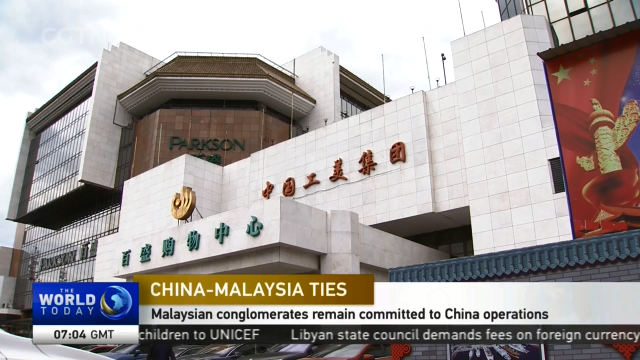
17:16, 19-Aug-2018
China-Malaysia Ties: Malaysian conglomerates remain committed to China operations
Updated
16:24, 22-Aug-2018
03:55

China-Malaysian ties go beyond the traditional trading relationship of commodities and machinery, and investment ties in hard infrastructure and now e-commerce. With Mahathir's official visit to China underway, our reporter Wei Lynn Tang spoke to two Malaysian corporations keeping pace in the Chinese market, including a retail giant which operates 46 stores across the country.
In 1994, Parkson made its first foray into China with its very first department store in Beijing's Fuxingmen Road.
Part of Malaysia's Lion Group, the retailer says it has never looked back since, taking cycles of downturns in its stride.
The rapid rise of e-commerce has hurt the department store sector, resulting in slumping profits over the years. At a time when local and international department store chains are downsizing in China, why is Parkson staying?
SHAUN CHONG SUI HIONG, CEO & EXECUTIVE DIRECTOR PARKSON RETAIL GROUP LIMITED "For most of the retailers, you cannot ignore a market a size of 1.3 billion people. China is rising very fast, since the opening up policy in early 1990s – the buying power and income level of the local consumers is increasing by leaps and bounds that's why we are very confident in this market."
In 2017, Parkson's same store sales in China rebounded with a 1.3 percent growth, after declining 6.7 percent the year before.
Parkson's strategy? It adjusted its product mix. And it believes this growth trajectory is sustainable.
SHAUN CHONG SUI HIONG, CEO & EXECUTIVE DIRECTOR PARKSON RETAIL GROUP LIMITED "We focused a lot on cosmetics, young fashion and sports apparel because we feel that those categories can attract young people to our stores."
As China gradually reduces its import tariffs, selling prices have come down, boosting demand, the company says. Parkson has also boosted its online marketing campaign to draw traffic to its physical stores.
WEI LYNN TANG BEIJING "This department store in Beijing's Financial Street may well be Parkson's last remaining outlet in the Chinese capital, as the company underwent restructuring, having shed non-performing assets in the last few years. But the message is clear for Parkson's management: that it remains committed to the Chinese market as a whole."
Sunway Group, a Malaysian conglomerate, shares the same sentiment.
The 2 billion US dollar market cap company has a spun pile plant in Zhuhai with an annual production capacity of over 200-thousand tonnes. Sunway has also recently launched a condominium development project in Tianjin Eco-City.
CHEW CHEE KIN, GROUP PRESIDENT SUNWAY GROUP "I think a lot of companies, if they don't understand the way Chinese thinks, maybe then they will say it's not conducive, but the rules are not different. But Chinese think differently from people in the West a little bit. Also, there's a language problem for Western company going into China. In fact, Malaysian companies are a very good bridge for East and the West. The Korean used to be a venture partner because they did not know how to operate in China as well as we know. So, the environment is quite good, the only difference between China and many other countries is scale."
Sunway cites opportunities like medical care, hospitality, and education -- part of its business holdings back in Malaysia -- which it can roll out in China given the right time.
As Malaysia now has a new administration, it is the hope of these two Malaysian corporates, and safe to say, Corporate Malaysia at large, that Sino-Malaysian ties will continue to prosper as common ground between the two nations far outweigh the differences. Wei Lynn Tang, CGTN, Beijing.

SITEMAP
Copyright © 2018 CGTN. Beijing ICP prepared NO.16065310-3
Copyright © 2018 CGTN. Beijing ICP prepared NO.16065310-3